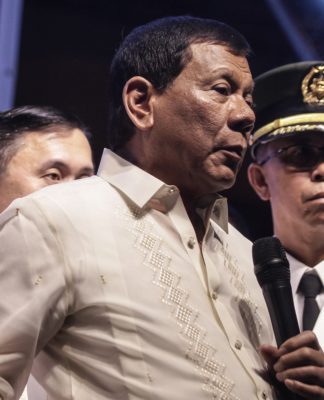IT IS just as well that the Catholic Bishops Conference of the Philippines (CBCP) has resisted calls for it to name its candidates in the May elections. There’s no need to because it has, after all, come up with the criteria to guide voters on choosing candidates based on the Catholic Church’s moral and social teachings.
If the Church is going to be politically active, it is not the bishops who will take the front line; it will have to be the laity. The principle of subsidiarity dictates that lay people, who have the competence in secular matters, take the active role in politics. Lay people can not only come up with lists of highly recommended political candidates; they can also organize political parties to put the Church’s moral and social teachings into political action.
Moreover, for the Catholic bishops to name their candidates would only aggravate the personality orientation of Philippine politics. Filipinos should vote based on issues, not personalities. If the personality dimension is to be considered, it is to determine a candidate’s credibility, conviction, and integrity.
For us in the Varsitarian, we believe candidates should champion a platform that is committed to the dignity of life, strong family values, democracy and peace, education and science, personal and public integrity, and an economic agenda for the common good.
We believe that the dignity of life and family values are reflected in parties and candidates that actively carry the pro-life, pro-family, and pro-poor platform. Such a platform rejects population control, which basically blames poverty on the poor.
Population control has been unmasked by Nobel-winning economists like Simon Kuznets, Gary Becker and Amartya Sen as a sham, with no scientific basis. Although no Nobel economist is willing to wager his reputation by forwarding the claim that population control may have some scientific bases, the worst hoax of the new millennium continues to be the pet advocacy of professional grant chasers, lobbyists, tax-shelter-seeking super capitalists, radical feminists, big business, and multinational advertising exactly because they make money or get good copy for themselves out of it.
The Philippines is not overpopulated. Its birth rate is healthy and merely allows for natural replenishment. A falling birth rate has social security and geopolitical implications, which are evident in the demographic winter being suffered by Japan and Europe.
Let there be no mistake about it. Population control is social engineering and neo-imperialism. How else would one explain that aid agencies from the West would like the Philippines to adopt a family planning policy so that it would create “contraceptive needs” and then buy condoms and contraceptives from the West? How else could one explain that a Newsweek-featured new book on “Medical Apartheid,” or the use of colored people for experimentation, reported the 1991 experiment that implanted the contraceptive Norplant (later banned in the US for its dangerous side effects) into uninformed African-American teenagers in Baltimore and was applauded by population-controllers as a way “to reduce the underclass”?
Family planning will not solve poverty since poverty is caused by poor public policy planning, mismanagement, and corruption. And pouring resources at population control which has no scientific basis is a case of mismanagement and corruption.
The Varsitarian commends Joker Arroyo, Ralph Recto, Mike Defensor, and Aquilino Pimentel III and others like them who have bravely taken a stand for life. Voters must realize that life is the primordial human right. Without life, other rights cannot be realized. And as there will be no rights without life, there will be no strong society without strong families. Thus, to be pro-life is to be pro-family.
In addition, a consistent ethic of life means adhering to the cherished precepts of constitutional democracy such as civilian supremacy over the military. The Varsitarian frowns on the likes of Gregorio Honasan, Antonio Trillanes, and other candidates who have a record of using their membership in the armed forces in betraying the state and the civilians they are supposed to protect. Filipinos must vote for candidates who will uphold and defend civil liberties, such as the right to assembly, freedom of expression, right to dissent, and the freedom of the press.
And because the pro-life platform means both the protection of life and the realization of its potentials, the Varsitarian backs political platforms that will improve the quality of life through education, health and other social services. Educational opportunities must be secured against the commercialization of education by profiteers, politicians and bureaucrats. Candidates must come up with platforms that will help private basic education—Catholic, sectarian and non-sectarian—provide mass education, which is the state’s constitutional duty.
Political platforms should also focus on improving Philippine science and technology so that it will greatly aid Philippine development and improve the quality of life of Filipinos. A humanist-based S&T also means a policy regime where the environment is protected and conserved.
As for economic policies, the Varsitarian seeks an economic planning platform that is realistic and humanistic, one that would steer clear of the gross excesses of liberal capitalism and utopian socialism. The state should stay out of business as a rule; thus, the Varsitarian rejects the interventionism or “legalized extortionism” of the right as well as the propensity for ultra-regulation, nationalization and protectionism of the left, which is another form of extortion. Either way, a liberal capitalist system or a utopian socialist set-up is a form of totalitarianism.
If government has a say in the political economy, it is to see to it that rules are equably enforced not only to level the playing field but also and more important, to protect the poor and uphold the common good.
In surveying the candidates, a record of competence, integrity, and excellence are the rule of thumb. And this record can be gleaned, more or less, in the commitment of candidates to the essential principles of Christian humanism. The Catholic vote is a conscience vote.


















